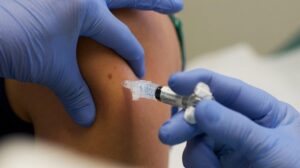
Bitcoin is trading near the psychologically important mark of $20,000 on Monday after the fall of the cryptocurrency rate on Saturday to the lowest level in 18 months.
According to CoinDesk, the price of bitcoin at 11:35 Moscow time is $20444. On Saturday, it fell to $17,630, but on Sunday it bounced back above $20,000.
Last week, during which the Federal Reserve System (Fed) raised the base rate by 75 basis points (bp) at once, turned out to be quite volatile for the cryptocurrency market, and experts believe that the current week will also be difficult, writes Market Watch.
“We may be out of the bottom of the market if bitcoin can quickly rise above $20,000 and hold there on Tuesday-Wednesday,” said Winnie Langham, chief executive officer of streaming platform Waitroom. become a tough resistance level.”
Bitcoin has fallen 57% since the beginning of the year, and its fall from the November peak of $69,000 is about 70%.
While some analysts see the beginning of a new “crypto winter” that will eventually end, others believe that the current downturn in the cryptocurrency market could mean the end of the industry as a whole.
The ethereum exchange rate, which also fell sharply on Saturday, rose in price by 15% over the past 24 hours, to $1113.28.
Two days earlier, market expert Igor Stakovichenko, responding to a request from Open4Business, said that in the current situation, the fall of the bitcoin market below 22,000 launched a new, even deeper “bearish phase” of the cycle, as it greatly shook the position of long-term holders of the asset. The long-term holders, who had held their positions during the last drops, could not stand it and started dumping the cue ball at the lowest prices.
“This shook the entire structure, and both technical and macroeconomic indicators today indicate a possible fall in the main cryptocurrency to 16,000 or even lower,” the expert said.
However, according to Stakovichenko, it is too early to bury bitcoin, as “whales” (investors owning more than 10,000 BTC) continue to accumulate this digital currency, which may indicate the possibility of growth in the medium and long term. In addition, the expert predicted possible stabilization and even some growth of the world’s main cryptocurrency.

Yesterday, Bitcoin once again came close to the critical level of $20,000 per 1 BTC. Even the record-breaking increase in the interest rate of the Fed did not save the main cryptocurrency from falling. However, it could not save, since cryptocurrencies are a fairly young investment asset, which has not yet been affected by transition periods and changing phases of economic growth.
The crypto market continues to develop according to its own rules, remaining a speculative product, the high volatility of which attracts a large number of traders who are ready to take risks for the sake of quick earnings. Most often, such traders massively buy cryptocurrency during the growth phase and start to get rid of it just as massively when the market falls, which stimulates a further collapse.
But this time the situation is somewhat different. Many analysts are talking about the beginning of the “darkest time for crypto” in its entire history. The traditional opponents of bitcoin have also revived. Thus, the famous financier Warren Buffett recently stated:
“If I were now offered to buy bitcoins at $25, I would not take them. What should I do with them then? I would have to sell them back to you later. This is a dead end.”
And he added that he doesn’t know if bitcoin will rise or fall next year, in five or ten years, but he knows for sure that he does not produce anything.
The Open4business publication turned to Igor Stakovichenko, an expert in economics and finance, with a request to comment on the situation in the cryptocurrency market. According to the economist, the problem of the lack of a real resource and production base for digital assets has become especially acute in recent months. This is due to the fact that Russian aggression in Ukraine disrupted supply chains and led to higher prices for real sector products in the global economy.
“The fall in the capitalization of the largest companies and the crisis in the stock market naturally led to the collapse of the cryptocurrency market, as many investors considered this asset too risky,” the financier notes.
Stakovichenko stressed that in the current situation, the fall of the bitcoin market below 22,000 launched a new, even deeper “bearish phase” of the cycle, as it greatly shook the position of long-term holders of the asset. The long-term holders, who had held their positions during the last drops, could not stand it and started dumping the cue ball at the lowest prices.
“This shook the whole structure, and both technical and macroeconomic indicators today indicate a possible fall of the main cryptocurrency to 16,000 or even lower,” the expert said.
However, according to Stakovichenko, it is still too early to bury bitcoin, as “whales” (investors owning more than 10,000 BTC) still continue to accumulate this digital currency, which may indicate the possibility of growth in the medium and long term.
BITCOIN, CRYPTOCURRENCY, CRYPTOCURRENCY_MARKET, EXPERT, FINANCE, STAKOVICHENKO, ИГОРЬ_СТАКОВИЧЕНКО

The current price of gasoline at 52-55 UAH/liter and diesel fuel at 58-60 UAH/liter is the equilibrium point for the market, but with the gradual arrival of new volumes of oil products, the price for them will decrease, the director of the A-95 consulting group believes Sergey Kuyun.
“With prices of UAH 52-55/liter for gasoline and UAH 58-60/liter for diesel fuel, as I see it, the market feels normal, queues are decreasing. To some extent, the market has found a balance point, and then it will begin to fill with new batches, and this should lead to lower prices,” he said at a briefing at the Media Center in Kyiv on Monday.
At the same time, Kuyun noted that the price of fuel at 40-45 UAH per liter, which was determined during state regulation, was fair for a stable, secure market, “which we do not have today.”
“Accordingly, we need to reduce consumption, bring down the hype,” the expert said.
As reported, according to the A-95 group, the average retail prices for gasoline and diesel fuel in Ukraine increased by 22-30% in the period May 16-23, in particular, the average retail prices for A-95 gasoline increased by 10%. 72 UAH/liter, up to 50.84 UAH/liter, premium A-95 – by 9.85 UAH/liter, up to 51.51 UAH/liter.
In addition, retail prices for diesel fuel increased by UAH 13.24/liter, up to UAH 56.49/liter, for liquefied gas, by UAH 4.14/liter, up to UAH 39.24/liter.
By Resolution No. 594 of May 17, 2022, the Cabinet of Ministers suspended the state regulation of fuel prices introduced a year ago due to quarantine, expecting that gasoline prices would not exceed UAH 52/liter, diesel fuel – UAH 58/liter.
The decision to cancel the maximum margin for gas stations was made so that market operators could saturate the Ukrainian oil market with the necessary resource in the face of its shortage after reorienting to supplies from the western border and the Kremenchug refinery bombed by Russia.
At the same time, the State Service for Food Safety and Consumer Protection announced the start of inspections of gas stations based on consumer complaints about inflated prices, refusal to pay with cards and the absence of settlement documents.

During the period of Russian military aggression, Ukraine should allow the import and sale of fuel of the Euro-4 ecological standard, director of the A-95 consulting group Serhiy Kuyun said.
“It is necessary to temporarily allow the use of fuel of Euro-4 standards. The equipment of the Armed Forces of Ukraine will not notice this at all. Tanks, ZILs, diesel locomotives and others will go easily – this equipment is not new for the most part,” he wrote on his Facebook page.
“Civilian transport will also survive. Strict European fuel requirements are mainly for environmental purposes. Now there are much more serious threats to our life and health than the exhaust in traffic jams from refugees’ cars,” Kuyun said.
According to him, there are interesting price offers for Euro-4 on the foreign market, which will increase the filling of the Ukrainian market with fuel.

The decision to mix vaccines against COVID-19 will be made exclusively by the doctor who directs the person to vaccination, said Deputy Minister of Health, Chief State Sanitary Doctor Ihor Kuzin.
“The main recommendation was that, in fact, mixing of vaccines is allowed, but subject to the algorithm. Mixing one or another vaccine is not the choice of the patient, it is solely the decision of the doctor who directs for vaccination,” he said in an interview with the Ukrayinska Pravda publication.
According to Kuzin, the doctor can make such a decision only in a few cases: if after the first dose the patient had a severe adverse reaction; due to humanitarian problems. For example, if a person abroad received the first Moderna vaccination and, having returned to Ukraine, does not have the opportunity to be vaccinated with it for the second time.
The deputy minister added that it is possible to combine either mRNA vaccines (Moderna and Pfizer), or the first dose of AstraZeneca, and the second with mRNA vaccines. Mixing of other types of vaccines is not envisaged yet.

The Macroeconomic Review section has been launched on a monthly basis within the framework of the Experts Club. In the first video, the co-founder of the project, PhD in Economics, Maksim Urakin, analyzed the main macro indicators.
“The goal of our Macroeconomic Review project is to provide the viewer with the key statistics and information in the most convenient form, to do it succinctly and clearly, replacing cumbersome tables and lengthy reasoning with graphic analysis,” research organizer Maksim Urakin said.
In the block on the population of Ukraine, the latest data of the State Statistics Service on the number of residents of our country were presented, a comparison was made between the statistics of state bodies and the indicators of the so-called “electronic census” of January 2020. In addition, the latest data on unemployment and wages in the regions were studied.
In the economic block, the indicators of GDP, the volume of foreign trade, the main trade partners of Ukraine, the national debt, the indicators and sources of investment and industrial production are analyzed.
All data is presented in the form of graphs and diagrams that complement the visual backdrop.
In the future, the Experts Club will analyze and present both the current statistics of Ukraine and compare the latest data with the previous periods, as well as with the indicators of other countries.
In addition, a series of thematic programs are planned, which will be devoted to the state of various sectors of the Ukrainian economy and their characteristics over the period of 30 years of independence.
The full video can be found on the Experts Club YouTube channel at the link:
https://www.youtube.com/watch?v=tCKGn3uGR_Y
You can subscribe to the Experts Club channel here.